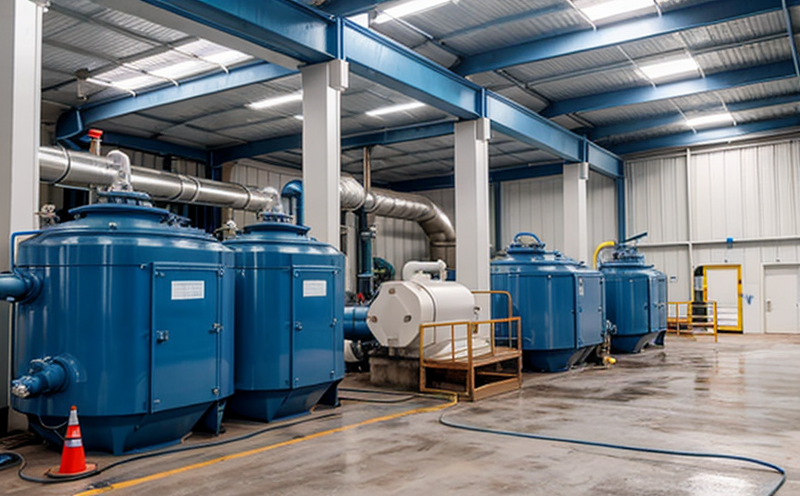IMO BWM.2/Circ.70 Revised G8 Testing for Ballast Water Treatment
The International Maritime Organization (IMO) has set stringent regulations to control the spread of invasive species through ballast water. The revised guidance note IMO BWM.2/Circ.70, known as G8, introduces a more robust framework for testing and compliance with ballast water treatment systems (BWTS). This service ensures that your ballast water treatment system meets these standards, thereby protecting the environment from invasive species while ensuring compliance with international regulations.
The test protocol outlined in IMO BWM.2/Circ.70 Revised G8 is designed to evaluate how effectively a BWTS can remove and kill organisms present in ballast water. The testing process involves several critical stages that ensure the system’s efficacy:
- Preparation of the specimen: This involves collecting a representative sample of ballast water containing known microorganisms.
- Application of treatment: The collected water is subjected to the BWTS according to standard operating procedures.
- Post-treatment analysis: The treated water is analyzed using advanced microbiological techniques, including quantitative PCR and microscopy, to determine the reduction in viable organisms.
- Efficacy assessment: Based on predefined criteria, the system's performance is evaluated against international standards such as ISO 22416-1:2020 for ballast water treatment systems.
The success of this testing process lies not only in the accuracy and precision of the equipment used but also in the thoroughness of sample preparation. Our laboratory employs state-of-the-art technology, including high-performance liquid chromatography (HPLC) and mass spectrometry, to ensure that even the smallest organisms are detected.
Understanding the real-world implications of this test is crucial for quality managers and compliance officers. By ensuring your system complies with G8 standards, you not only protect the marine environment but also avoid potential legal penalties and reputational damage. For R&D engineers and procurement professionals, this service provides invaluable insights into the performance capabilities of various systems.
The IMO's stringent requirements underscore the need for rigorous testing protocols to ensure that ballast water treatment systems are effective in reducing harmful organisms. Our laboratory’s expertise in marine and ship equipment testing ensures that you receive accurate, reliable results that meet international standards. We pride ourselves on delivering services that help our clients stay ahead of regulatory changes and maintain a competitive edge.
Why Choose This Test
The IMO BWM.2/Circ.70 Revised G8 testing is essential for several reasons:
- Regulatory Compliance: Ensures that your ballast water treatment system meets international standards.
- Environmental Protection: Prevents the introduction of invasive species into new aquatic environments, safeguarding biodiversity.
- Avoidance of Penalties: Helps avoid fines and legal actions associated with non-compliance.
- Enhanced Reputation: Demonstrates a commitment to environmental responsibility and sustainable practices.
- Informed Decision-Making: Provides critical data for R&D teams to improve system performance and efficiency.
- Customer Trust: Reassures stakeholders of your company's dedication to high-quality and environmentally friendly operations.
By choosing our laboratory, you gain access to a team of experts with deep experience in marine and ship equipment testing. Our commitment to accuracy, reliability, and international standards ensures that you receive comprehensive and actionable results.
Quality and Reliability Assurance
The quality and reliability of our services are paramount. We adhere strictly to ISO 9001:2015 and ISO/IEC 17025:2017, ensuring that every test is conducted in a controlled environment with precise methodologies.
Our laboratory uses advanced analytical techniques such as flow cytometry and automated colony-forming units (CFUs) to ensure accurate quantification of microbial counts. These technologies provide precise measurements that are essential for assessing the efficacy of ballast water treatment systems.
We also employ robust quality control measures, including inter-laboratory comparisons and proficiency testing programs recognized by international bodies such as APLAC and ILAC. This ensures that our results are consistent and reliable across different environments and test conditions.
In addition to technical expertise, we provide comprehensive reporting services tailored to meet the specific needs of our clients. Our reports include detailed descriptions of the testing process, data analysis, and recommendations for improvement or further testing if necessary. This level of transparency and detail helps ensure that you have all the information required to make informed decisions.
International Acceptance and Recognition
The IMO BWM.2/Circ.70 Revised G8 test is internationally recognized and accepted by various regulatory bodies around the world. This recognition ensures that your compliance efforts are not only aligned with global standards but also meet the expectations of international shipping authorities.
Our laboratory’s accreditation to ISO/IEC 17025:2017 guarantees that our testing methods, facilities, and personnel meet stringent quality requirements. This accreditation is recognized by numerous countries, including the United States (NVLAP), Canada (ACB), and European Union member states.
The results of your IMO BWM.2/Circ.70 Revised G8 tests are accepted by major ports worldwide, ensuring that your ballast water treatment system can operate seamlessly across international boundaries. This acceptance also facilitates smoother interactions with various stakeholders, including port authorities, shipping companies, and environmental organizations.
By choosing our laboratory for this important service, you not only comply with international regulations but also position yourself as a leader in sustainable maritime practices. Our commitment to excellence ensures that your compliance efforts are respected globally, enhancing your reputation and operational efficiency.





